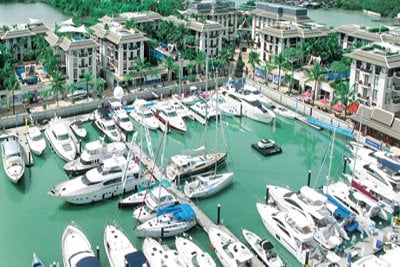PIMEX boosts marine-triangle tourism

PHUKET: At the forefront of Asia’s growing marine leisure industry, Phuket island is one of the top five cruising destinations in the world, and lies in the heart of the emerging ‘Andaman Marine Triangle’.
Consisting of Phuket, Phang Nga and Krabi provinces, the Andaman Marine Triangle is home to some of the most stunning sailing grounds in the world.
Indeed, the natural attractions and associated marine leisure industry, is the single largest asset for the area’s tourism industry.
Highlighting the industry’s rich offerings is Asia’s largest in-water boat show, the Phuket International Boat Show (PIMEX) – this year’s event be held from March 29 to April 1 at the award-winning Royal Phuket Marina on the island’s east coast.
PIMEX plays an integral role in creating and stimulating demand for marine products and services in Asia. Over 5,500 visitors attended the 2011 show to view the US$ 100 million of boats on display, as well as a magnitude of other marine and lifestyle offerings.
PIMEX connects buyers with sellers in the marine and luxury lifestyle space, and with the largest in-water display in the region, allows potential buyers to view boats first hand. International buyers often choose to leave their boats in Phuket’s marinas, so they can enjoy the facilities and surrounding cruising grounds at their leisure.
The trend of marina growth can be seen expanding from Phuket to other parts in the Andaman Marine Triangle. Namely, there are two new marinas in Krabi including the Krabi Boat Lagoon and Krabi River View, in addition to one more, the Port Takola Marina in the pipeline, adding almost 400 berths to the triangle, upon completion.
Over one billion baht of marina infrastructure development spending is expected in the Andaman Marine Triangle over the next five years.
As marinas in the Asian region are filling up. PIMEX is positioned as a key marketing and promotional tool for Phuket and beyond, helping to position the Andaman Marine Triangle as the marine leisure playground of Asia.
Both international and domestic markets are proving significant.
“We welcomed over 15 visitor nationalities last year, and of particular interest was the growing numbers of Russians and Chinese. A number of exhibitors noted a growing trend of Thais showing interest in buying into the marine leisure lifestyle,” commented Show Director, Andy Dowden.
“We are seeing more interest in exhibitors from China, Australia and New Zealand in particular this year. PIMEX has become the boat show in Asia to showcase boats, marine and lifestyle products to a large international audience,” added Dowden.
Targeting high net worth individuals and marine leisure enthusiasts, top international boat brands will be on display as well as leading marine brands and lifestyle products including luxury real estate and marina developments.
Phuket is the gateway to the Andaman Marine Triangle with more than 200 direct international flights weekly from major tourist markets in Asia and Europe. The three provinces share the same coastline and marine environment.Together they have become the marine playground for the rich and famous, wealthy, celebrities, and tourists from around the world.
With its long established and well developed infrastructure, Phuket holds a pivotal position in the Andaman Marine Triangle, and is home to four world-class marinas with a capacity of over 750 boats.
As reported by Channel News Asia: “The amount of private wealth in Asia is estimated to triple to US$16 trillion by 2015, according to Swiss private bank Julius Baer’s annual wealth report done jointly with CLSA.”
It is this growth in regional wealth, combined with the desire of boat owners wanting to relocate from traditional cruising grounds, that continues to fuel the growth of the marine leisure industry in the region.
In line with this growth, large-scale marine infrastructure in Phuket continues to develop. Further investment by established Phuket marinas is expected to be over 500 million baht, and a likely expansion of berth capacity by more than 20% over the next five years.
For more information, visit www.phuketboatshow.com.
Latest Thailand News
Follow The Thaiger on Google News:


























